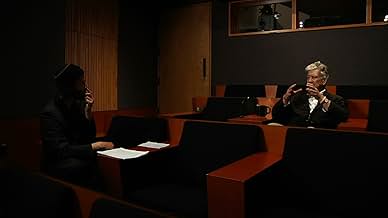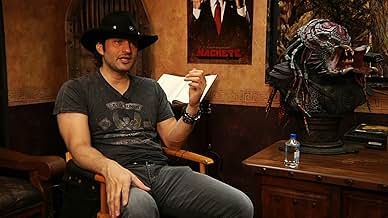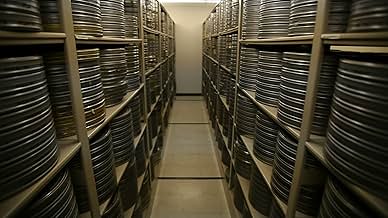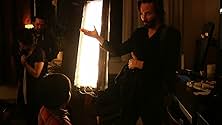The documentary investigates the history, process and workflow of both digital and photochemical film creation.The documentary investigates the history, process and workflow of both digital and photochemical film creation.The documentary investigates the history, process and workflow of both digital and photochemical film creation.
- Director
- Writer
- Stars
- Awards
- 1 nomination total
- Director
- Writer
- All cast & crew
- Production, box office & more at IMDbPro
Featured reviews
Film is dead, or is it? With major distributors in USA going digital this year in lieu of film, the death knell has been sounded that perhaps it's not too long before celluloid film projection is a thing of the past, and with it comes digital filmmaking, production, distribution and projection. But does it have to be that way, and can both mediums co-exist to satisfy the various sections of the creative market? Produced by Justin Szlasa and Keanu Reeves, the latter who was here in Hong Kong for a masterclass, Side by Side is the documentary written and directed by Christopher Kenneally, that deep dives into both sides of the equation.
And who better than to interview those who have dabbled with both mediums? What made this documentary a compelling watch is Keanneally's ability to cover an entire range of topics related to this issue, tracing the history of both mediums, especially the digital one, and giving depth into backgrounds, reasons and rationale taken from those who have dealt with both old and new technologies. Having Keanu Reeves turn into the interviewer works in both levels of attracting the casual viewer into watching this, as well as on the interview front, made it easy for filmmakers to relate and open up to one of their own, as they talk about the medium, how it impacts filmmaking, and from acting in front of the camera, the camera technologies themselves, and the case for distribution and exhibition, weighing in on the pros and cons at every stage.
These filmmakers are none other than the who's who of Hollywood luminaries, such as James Cameron, George Lucas, Martin Scorsese, David Fincher, Robert Rodriguez, Christopher Nolan, Danny Boyle, Richard Linklaer, David Lynch, Joel Schumacher, Steven Soderbergh, Lars von Trier, and both Lana and Andy Wachowski whom Keanu Reeves made the prolific Matrix trilogy. And it's not just directors, but also containing interviews with editors and cinematographers such as one of my personal favourites Wally Pfister, who together with Nolan stand on the side of celluloid, famously resisting Warner Bros' attempt to turn their lucrative Dark Knight projects into the digital or 3D formats.
While one may get distracted by the star studded lineup, we get to see how each are so passionate about the medium they believe in, and the compelling arguments they make for and against their case, listening from the horse's mouth of those who are in the industry, together with the satisfaction gained and challenges they face. For instance, like Fincher, digital filmmaking gave rise to cameras that can be designed to cater to the nature of the shots he had intended, without which films like The Social Network, or The Girl With the Dragon Tattoo, cannot achieve certain shots or have the camera angles so desired. Everyone provided their own memorable soundbites when they engage in this discourse, so much so that you'd soon find everything that's being said becoming terribly sexy and seductive in their arguments.
But Conneally does an excellent job in not allowing any one filmmaker to run away with the presentation he so decided, allowing arguments to be made and the viewer to form his own conclusion. The pace moves at breakneck speed, hardly every pausing just like how digital filmmaking has directors almost never calling it quits because the medium has run out, as you the audience will definitely find an area in which you have little knowledge of, but thanks to this film and its incredible breadth adopted for its scope, you're bound to come out of it a little bit enlightened about the entire technical process, the evolution of filmmaking technologies, as well as gain new found appreciation for those who are so passionate in their filmmaking that it's automatically shown in the final cut they put out for projection.
No film related topic was taboo, as the documentary also took a look at archival processes, which contains a little bit of an irony. If there's a flaw to this wonderfully made documentary, it will be that its focus is still inherently Hollywood's own, since there is a distinct lack of interviews and gathering of content outside of Tinseltown. Perhaps an apt follow up to this would warrant a lot more interviews to be done with filmmakers around the world, but I'm guessing most of the responses will already have been covered by the mammoth scope here (and whose filmmakers are at the forefront of technology given geeks like Cameron), and at best appear as supplemental discs should this ever be released on DVD format sometime soon. Definitely highly recommended viewing for everyone, film buffs or otherwise, with great material yet to be seen in upcoming films included as well.
And who better than to interview those who have dabbled with both mediums? What made this documentary a compelling watch is Keanneally's ability to cover an entire range of topics related to this issue, tracing the history of both mediums, especially the digital one, and giving depth into backgrounds, reasons and rationale taken from those who have dealt with both old and new technologies. Having Keanu Reeves turn into the interviewer works in both levels of attracting the casual viewer into watching this, as well as on the interview front, made it easy for filmmakers to relate and open up to one of their own, as they talk about the medium, how it impacts filmmaking, and from acting in front of the camera, the camera technologies themselves, and the case for distribution and exhibition, weighing in on the pros and cons at every stage.
These filmmakers are none other than the who's who of Hollywood luminaries, such as James Cameron, George Lucas, Martin Scorsese, David Fincher, Robert Rodriguez, Christopher Nolan, Danny Boyle, Richard Linklaer, David Lynch, Joel Schumacher, Steven Soderbergh, Lars von Trier, and both Lana and Andy Wachowski whom Keanu Reeves made the prolific Matrix trilogy. And it's not just directors, but also containing interviews with editors and cinematographers such as one of my personal favourites Wally Pfister, who together with Nolan stand on the side of celluloid, famously resisting Warner Bros' attempt to turn their lucrative Dark Knight projects into the digital or 3D formats.
While one may get distracted by the star studded lineup, we get to see how each are so passionate about the medium they believe in, and the compelling arguments they make for and against their case, listening from the horse's mouth of those who are in the industry, together with the satisfaction gained and challenges they face. For instance, like Fincher, digital filmmaking gave rise to cameras that can be designed to cater to the nature of the shots he had intended, without which films like The Social Network, or The Girl With the Dragon Tattoo, cannot achieve certain shots or have the camera angles so desired. Everyone provided their own memorable soundbites when they engage in this discourse, so much so that you'd soon find everything that's being said becoming terribly sexy and seductive in their arguments.
But Conneally does an excellent job in not allowing any one filmmaker to run away with the presentation he so decided, allowing arguments to be made and the viewer to form his own conclusion. The pace moves at breakneck speed, hardly every pausing just like how digital filmmaking has directors almost never calling it quits because the medium has run out, as you the audience will definitely find an area in which you have little knowledge of, but thanks to this film and its incredible breadth adopted for its scope, you're bound to come out of it a little bit enlightened about the entire technical process, the evolution of filmmaking technologies, as well as gain new found appreciation for those who are so passionate in their filmmaking that it's automatically shown in the final cut they put out for projection.
No film related topic was taboo, as the documentary also took a look at archival processes, which contains a little bit of an irony. If there's a flaw to this wonderfully made documentary, it will be that its focus is still inherently Hollywood's own, since there is a distinct lack of interviews and gathering of content outside of Tinseltown. Perhaps an apt follow up to this would warrant a lot more interviews to be done with filmmakers around the world, but I'm guessing most of the responses will already have been covered by the mammoth scope here (and whose filmmakers are at the forefront of technology given geeks like Cameron), and at best appear as supplemental discs should this ever be released on DVD format sometime soon. Definitely highly recommended viewing for everyone, film buffs or otherwise, with great material yet to be seen in upcoming films included as well.
Hollywood insiders are aware of a battle that has been brewing for quite sometime now: the technology to capture the image has two camps- film and digital and each are perhaps overwhelming the other. Film is photomchemical and the method by which cinema has been created and projected for all these years (since the late 1890). Digital cameras are new on the block and because they can do everything a film camera can but with less production costs, they are vying to be the medium every director chooses. Keanu Reeves questions industry insiders from top directors and cinematographers and gets a honest non biased overview. This is a good watch for anyone interested in the technical and "behind the camera" scenes of making of film and television. The documentary is precise and educative.
I tend to read proper film critics for their opinions not only on specific films but also essays on themes, genres, movements and so on; I consider myself a total amateur on such subjects but I find it interested to listen to those who are not. Coming to Side by Side I wasn't sure if it would be too dry for me to get into or if it would be too simplistic for me to stay interested in for just under two hours. The film essentially looks at the transition from celluloid to digital in film making – from filming through to post through to projection in the cinema and the means of delivery to the viewer. It is an ambitious goal but it is one that it does very well and in a way that flows and is accessible.
I guess that for those with a real good working knowledge of the technology and the process, it may be too simplistic but for the casual viewer and enjoyer of films, there is enough detail here to engage and interest, but not so much that I felt overwhelmed with technical detail that I wasn't interested in. The film is really made up of Reeves acting as interviewer with a range of people involved in all the various aspects of the process – directors, cinematographers, editors, camera manufacturers etc. and he does a decent job, but not a great job in this regard. Fortunately this is not really his main role because it certainly seems that as producer he has helped Kenneally get a lot of very famous people to agree to be in the film. This range of talent and opinion makes for an interesting film, so while we follow development of things over time, we tend to get both sides as the title suggests.
Most of the contributors are interesting and their soundbites are well edited and the film itself is put together very well so that it covers time and technology in a way that makes sense, engages and never outstays its welcome. It probably won't do much for the technical enthusiast but for fans of film and cinema it is very much worth seeing as entertainment and education.
I guess that for those with a real good working knowledge of the technology and the process, it may be too simplistic but for the casual viewer and enjoyer of films, there is enough detail here to engage and interest, but not so much that I felt overwhelmed with technical detail that I wasn't interested in. The film is really made up of Reeves acting as interviewer with a range of people involved in all the various aspects of the process – directors, cinematographers, editors, camera manufacturers etc. and he does a decent job, but not a great job in this regard. Fortunately this is not really his main role because it certainly seems that as producer he has helped Kenneally get a lot of very famous people to agree to be in the film. This range of talent and opinion makes for an interesting film, so while we follow development of things over time, we tend to get both sides as the title suggests.
Most of the contributors are interesting and their soundbites are well edited and the film itself is put together very well so that it covers time and technology in a way that makes sense, engages and never outstays its welcome. It probably won't do much for the technical enthusiast but for fans of film and cinema it is very much worth seeing as entertainment and education.
This is a documentary that every film enthusiast must watch. It will give you an understanding of the ways a feature film is shot and projected. To the unaware today most movies are shot on digital cameras as opposed to the photochemically styled film cameras of the past days. Both have their plus and minuses and in this documentary, Keanu Reeves goes about explaining the differences of the format and the opinion of most famous filmmakers on the subject. Featuring everyone from James Cameron to Martin Scorsese Side by Side is a great look at the technical aspect of cinema.
As a film student or just a movie lovers, you rarely got a chance to connect with cinema history, or meet with famous people in the industry who set the standard and created the masterpieces. This documentary gives it all in a friendly story telling mode that could benefit both professionals or just any random viewers
As much as it is about digital, it's equally about how cinema develop and what it would be like in the future. The documentary points out an interesting finding that it's the professionals, not the technology that drives the storytelling art forward. Each and every of them offer their best performance and artistry via the choice of techniques they made.
It's fantastic to see how filmmakers form different groups of opinions and stay faithful to it. While the film did not intend to come to any conclusion about future of cinema in digital or old style film, it clearly set up a basic understanding about filmmaking as a painstakingly process that require endless decision making based on personal visual creative interpretation.
A nice to watch movie for film students, especially those are fans of David Lynch, James Cameroon or George Lucas, the main speakers
As much as it is about digital, it's equally about how cinema develop and what it would be like in the future. The documentary points out an interesting finding that it's the professionals, not the technology that drives the storytelling art forward. Each and every of them offer their best performance and artistry via the choice of techniques they made.
It's fantastic to see how filmmakers form different groups of opinions and stay faithful to it. While the film did not intend to come to any conclusion about future of cinema in digital or old style film, it clearly set up a basic understanding about filmmaking as a painstakingly process that require endless decision making based on personal visual creative interpretation.
A nice to watch movie for film students, especially those are fans of David Lynch, James Cameroon or George Lucas, the main speakers
Did you know
- GoofsIdentifies District 9 (2009) as being shot on the Sony F23. It was actually shot on Red One cameras.
- Quotes
Martin Scorsese: The only way you can make sure that a film or anything on the moving image is going to be around sixty or seventy years from now, interestingly enough, ironically enough, is celluloid.
- ConnectionsFeatured in Film '72: Episode dated 13 February 2013 (2013)
- How long is Side by Side?Powered by Alexa
Details
- Release date
- Country of origin
- Official sites
- Language
- Also known as
- Пліч-о-пліч
- Production company
- See more company credits at IMDbPro
Box office
- Gross US & Canada
- $58,825
- Opening weekend US & Canada
- $6,956
- Aug 19, 2012
- Gross worldwide
- $67,054
- Runtime1 hour 39 minutes
- Color
- Aspect ratio
- 1.85 : 1
Contribute to this page
Suggest an edit or add missing content






































